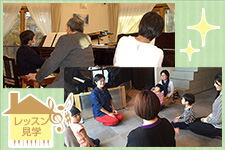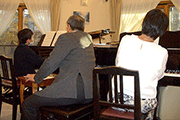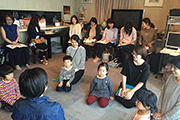What Are They Doing in the PTNA Lesson Observation Program?
2017/01/24 | コメント(0)
| トラックバック(0)
|
 PTNA Lesson Observation Program offers opportunities for piano teachers to visit studios and see lessons of senior teachers with rich experiences. In 2016, 292 participants visited 40 lecturers in total. Let us introduce two types of sessions.
PTNA Lesson Observation Program offers opportunities for piano teachers to visit studios and see lessons of senior teachers with rich experiences. In 2016, 292 participants visited 40 lecturers in total. Let us introduce two types of sessions.  One of them is the "dual piano lesson" by Mr.&Mrs.Sasaki, which was conducted last November in Karuizawa. Mrs.Keiko Sasaki, pianist, gave advices to students' performances in regards of finger touches, body postures, sonorities, expressions, etc. Then Mr.Kunio Sasaki, composer, taught musical analysis for the structural understanding of the pieces they were playing. After the demonstration lessons, participants and lecturers had discussions in order to review the lessons they have just observed. Participants were impressed to see the collaborative lessons and knew how students learned from different musical approaches and perspectives.
One of them is the "dual piano lesson" by Mr.&Mrs.Sasaki, which was conducted last November in Karuizawa. Mrs.Keiko Sasaki, pianist, gave advices to students' performances in regards of finger touches, body postures, sonorities, expressions, etc. Then Mr.Kunio Sasaki, composer, taught musical analysis for the structural understanding of the pieces they were playing. After the demonstration lessons, participants and lecturers had discussions in order to review the lessons they have just observed. Participants were impressed to see the collaborative lessons and knew how students learned from different musical approaches and perspectives. The other one is the "group piano lesson". Chihiro Otomo, lecturer, conducted 2 group lessons for pre-school kids (4 boys, 2 boys & 2 girls) to show how mothers were supportive and how children became collaborative one another. Otomo confessed that the very first lesson a few years ago ended in absolute failure, and thus she tried to talk with students' mothers and asked for their supports. She believes that one of the advantages of the group lesson is that children get motivated when working together with others, and thus they likely to practice more than their individual lessons. The group lessons consist of two parts; she teaches rhythmical exercises and singing collectively, and gives short piano lessons respectively, while others do finger training or another individual works. And there are 4 rules for the group lessons; if students could not commit 2 of them, they would have to leave. This would enhance their social skills.
The other one is the "group piano lesson". Chihiro Otomo, lecturer, conducted 2 group lessons for pre-school kids (4 boys, 2 boys & 2 girls) to show how mothers were supportive and how children became collaborative one another. Otomo confessed that the very first lesson a few years ago ended in absolute failure, and thus she tried to talk with students' mothers and asked for their supports. She believes that one of the advantages of the group lesson is that children get motivated when working together with others, and thus they likely to practice more than their individual lessons. The group lessons consist of two parts; she teaches rhythmical exercises and singing collectively, and gives short piano lessons respectively, while others do finger training or another individual works. And there are 4 rules for the group lessons; if students could not commit 2 of them, they would have to leave. This would enhance their social skills.In 2016, 156 out of 292 participants of the Lesson Observation Program applied for the first time. 70% of them were at their 40s and 50s. Among them, there were student members who want to be piano teachers after graduation from colleges. There were even experienced teachers who already served for competition adjudicators or representatives for STEP Stations. Curiosity and motivation for learning are the most important things, regardless of the age or career status.
From April-June 2017, 19 senior teachers will welcome you as lecturers at their studios.
【GoogleAdsense】